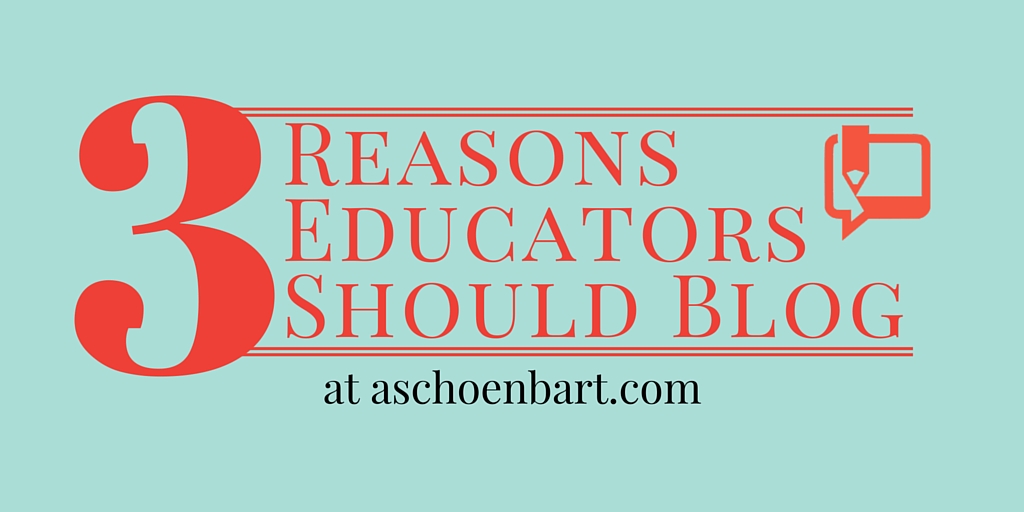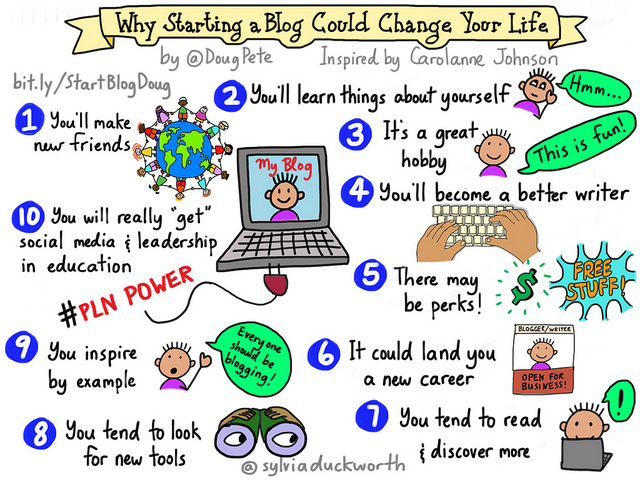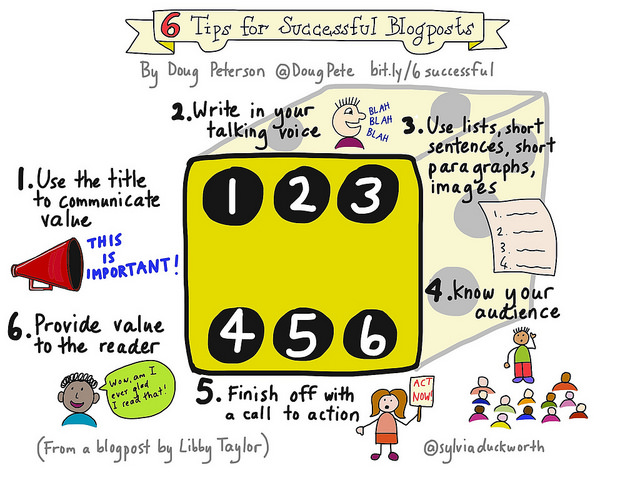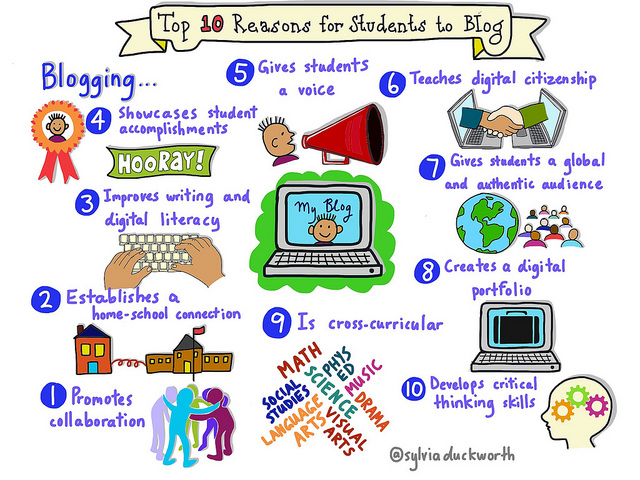3 Reasons Educators Should Blog


I’ve been pretty happy with my writing lately. I have a list of ideas for potential blogs on a Google Doc, and usually one rises to the top. Some weeks, it’s so clear what I want to say, and even when it’s not, my notes or teaching usually spark something worth writing about. Sometimes, though--like today, I’m just stuck. I hit the wall of writer’s block and just couldn’t figure out what I had that was worth sharing today. A half a dozen ideas, two different series of posts, and a question or two are all circling through my digital to-write pile, but nothing seemed just right, yet.
Like usual, I turned to my #PLN for support. Chris Nesi suggested I write about what I do when I have writer’s block. One thing led to another, and my notes for a rambling post about how to handle writer’s block brought back to one focus: purpose. Why do I write? Why should educators write? And what should we write about? And like most things in education, it all goes back to goals and purpose.
Calvin & Hobbes comic strip from 1995

If you’re already blogging or sharing your classroom in a different way, you probably have more to add to my list. If not, think about what you might have to share. While there are many reasons I like to write about my teaching and work, my 3 best reasons are explored below. When I’m stuck without a topic or focus, rather than just writing for writing’s sake, here are the reasons I try to come back to.
1. For Reflection and Growth
Writing about my teaching, student’s learning, personal growth, and professional life makes me a better teacher and a better writer. It forces me to organize my ideas, reflect on my practice and experiences, and think in new ways. While I hope that my readers find value in my writing, more and more posts are about my own reflection. For me, it’s cathartic and powerful to see growth unfold on the page.
In past years, I would intend to take notes on a lesson, revise a unit, or keep better track of model student work. Sometimes this worked, but more often something else got in the way. Between grading, planning, student meetings, and other professional responsibilities, it was hard to make the time. It’s still hard to make the time, but having a platform to share these reflections--even if only for myself--makes it so much more real and meaningful. These are the notes and messages that I can come back to again and again to always grow and do better.

2. To Recommend and Inspire
No teacher has a perfect lesson every day. But we all have those great days, inspirational ideas, and transformative practices. Whether it’s the activity you revised, new implementation of technology, or a really successful class discussion, the best learning rarely happens by accident. We have to plan for success with intent and critical thought. So when the lesson works (and even when it doesn’t), share it so that others can learn from the experience.
Tools and ideas to transform education. Sign up below.
When I start a new unit or approach an unfamiliar text, the first thing I do is search Google for inspiration. I look at web sites and blogs, ask questions on Twitter, and e-mail my colleagues. Instead of inventing brand new content and units, I want to make better use of my time and technology and #GoOpen by adapting from the great stuff that already exists. I hope that by sharing my challenges and successes, lessons, student work, and edtech recommendations, I can inspire others to do the same.

3. Share Your Awesome
I’ve used this phrase before and stand by it. Educators need to share their awesome. It’s not just about sharing with other teachers, but about telling the stories of our students, schools, and classrooms. Technology--whether it’s blogging, social media, or something else--allows us to make connections and open our classroom doors like never before, and to share what we do with the world. When we do something awesome (and we all do), it deserves to be shared with an authentic audience.
Too much of the story of education is told from skewed, displaced, and inexperienced perspectives. The more educators take control over the narrative of education, the more power the story has. Information today is transmitted around the world with a click and virtually anyone can create everything; the power of communication and branding has never been more powerful. I want to tell my story with transparency, honesty, and clarity to share our awesome.

As educators, we need to always remember our purpose and consider our impact. Whether it's in a conversation with a student, a lesson plan, or a piece of feedback, purpose matters. In blogging, too, I think it's important to step back once in a while and reflect about the why.
For more on the whys and hows of blogging in education, a quick Google search reveals hundreds of articles. They range from lists of blogs to follow to how to guides, and so much more. For more inspiration, I've incorporated Sylvia Duckworth's awesome sketchnotes on blogging. Take a look at her Sketchnote Flickr and website--they're great.
If you blog already, why do you? What do you like to write about? If not, what’s holding you back? What would you want to share with the world? Please share your ideas in the comments or on Twitter.
cross posted at www.aschoenbart.com
Adam Schoenbart is a high school English teacher, Google Education Trainer, and EdD candidate in Educational Leadership. He teaches grades 10-12 in a 1:1 Chromebook classroom at Ossining High School in Westchester County, NY and received the 2014 LHRIC Teacher Pioneer Award for innovative uses of technology that change teaching and learning. Read more at The SchoenBlog and connect on Twitter @MrSchoenbart.
